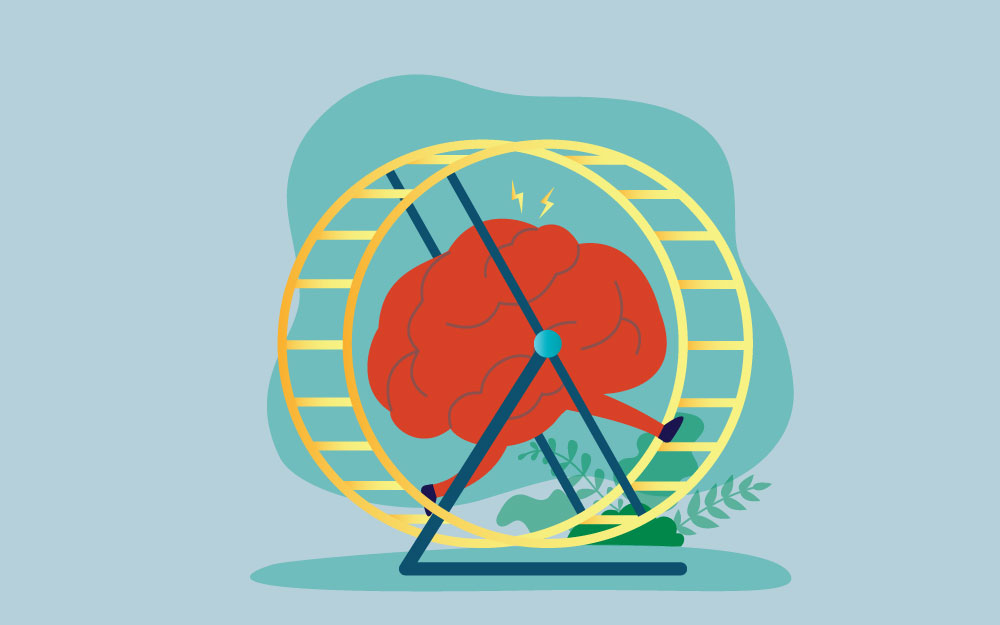Authored by: Natalie Barbrie, AMFT, adult therapist, Rogers’ Los Angeles clinic
 What is rumination?
What is rumination?
The ubiquitous answer to this would be repetitive or constant thoughts that negatively affect your mood. Basically, rumination is a mental compulsion that gets in the way of the things we would rather be doing. Our brains like to trick us into believing that by ruminating we are “figuring something out” or “accomplishing something,” when it’s actually just taking up our time. Rumination can also present as a verbal compulsion, which is excessive talking or overtalking.
What does rumination feel like?
Rumination can sometimes feel like there’s a hamster wheel inside your head, with a chubby little creature spinning tirelessly and endlessly. We tend to play out a situation over and over, looking for a clear answer, with no resolution. It also can feel like we don’t trust ourselves, questioning past and future decisions.
Why do people ruminate?
People definitely don’t ruminate for fun. It’s the worst! So why do people do it? Our brains can trick us into thinking we’re being proactive or accomplishing something. I believe that humans are wired to make sense of, or find meaning in situations to ease our anxiety. We want to solve problems or figure out the unknown. In truth… 99.9% of life is unknown. Please don’t quote me on that statistic, but I won’t overthink it, because it feels right.
What things do people commonly ruminate about?
Giraffes, the weird noise their car made, Rihanna’s latest romantic interest — rumination can be based on anything. However, through my work, I’ve noticed patterns or themes in what my patients often ruminate about. Some of these themes include past “mistakes” or conversations where a patient is uncertain what another person thinks. People suffering from OCD often believe they’re a bad person or that they’ve insulted someone after certain interactions. Other people replay thoughts of “Did I leave the lights on at home”?, “I had a dark thought, does that make me a serial killer?”, “Did I do something sexually inappropriate?”, “I should’ve done this more perfectly.”, “Is life meaningless?”, or the commonly OCD-associated theme of contamination –“I need to wash my hands because I just touched something contaminated.”
How does rumination affect a person’s mental health?
It may makes us feel irrational. It may make us doubt ourselves. It may make us feel like we’re in danger, and could keep us in the flight, fight, or freeze mode. Rumination can negatively affect our emotions, causing sadness, depression, anger, or apathy. It can make us feel unlovable and do a number on our self-esteem. At first, rumination can feel comfortable, or even reassuring, but after a while, it starts to eat away at us.
How does a person know when rumination has become a serious mental health challenge?
A good indication that rumination has become serious is when it takes up far too much time and energy, and our life is inhibited by repetitive thoughts. We can start to avoid people, places, or situations, or we can get stuck in thought loops. We can also form other compulsions based on our ruminations. Our life can start to feel unrecognizable and we stop doing the things we love.
What evidence-based treatment does Rogers offer to combat it?
At Rogers, we utilize cognitive behavioral therapy (CBT), which emphasizes that our thoughts, feelings, and behaviors are all interconnected. They all affect each other. More specifically, we engage our patients in ERP, exposure response therapy. ERP is characterized by exposure to what we fear the most. We do this gradually by using what we call an exposure hierarchy, as not to completely traumatize someone. As people repetitively complete these exposures, they eventually habituate, or get used to these distressing situations. Additionally, we use behavioral activation or BA. BA includes activities that patients complete based on their values, what they find enjoyable, or what they need to accomplish in their routine. BA is proven behavioral treatment for not only OCD but is the main treatment modality for depression.


